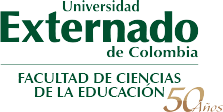9 de diciembre de 2022
Unsettling and Reconstructing Teachers’ Beliefs through Developing ELT Materials Otherwise
Astrid Núñez-Pardo, Ph.D. and María Fernanda Téllez-Téllez, Ph.D.
Inquiring into teachers’ beliefs on developing “contextualised and decolonised EFL materials otherwise that are sensitive to cultural diversity” (Núñez-Pardo, 2022, p. 702) has not been explored. Our qualitative exploratory and descriptive case study examined English teachers’ beliefs in regard to developing ELT materials otherwise in the master’s programme in Education with emphasis on English didactics at Universidad Externado de Colombia. The theoretical underpinnings of our study comprise teacher beliefs understood as complex individual perceptions and conceptions originated on their previous, present, and upcoming life, theoretical, and professional experiences, which evolve as teachers interact with others and shape their pedagogical practice. Also, informing this study is Núñez-Pardo’s (2020) proposal of creating localised or situated ELT “mediations [that] fulfil their sociocultural, political, academic, and aesthetic functions for teaching solidary, responsible, critical, and autonomous citizens who are conscious of their own culture, respectful of those of others, and aware of differences” (p. 114). These materials withstand and break conservative models of decontextualization, cultural essentialism, political relations, and dominant knowledges that permeate ELT.
To explore teachers’ beliefs about ways of developing EFL materials otherwise, they needed to critically ponder, analyse, and question their role as consumers and reproducers of commercial, generic and decontextualised EFL textbooks. However, in the process of questioning their own role, teachers might also interrogate the language policies they implement. In this regard, Patarroyo (2016) affirmed that language policies are careless regarding the pertinence of what EFL teaching and learning entails within the country they are carried out, disregarding their own context, textbooks, and students and teachers’ requests.
Concerning the need of having context responsive language materials and curriculum, Díaz et al. (2015), in their study on teachers’ beliefs in Chilean state-funded schools regarding the teaching and learning of English, found in one of their categories of analysis that some participants believed in the need to adjust the language curriculum and crate new complementary materials, whether they are distant from their context realities or require innovation. Thus, there is a shared teachers’ belief for both decontextualized EFL materials and curriculum, which allow us to continue inquiring into the relevance of developing contextualised and decolonised EFL materials otherwise. Likewise, as teachers are aware of the risks of replicating and reproducing decontextualized culture and knowledge of EFL materials, they also need to be mindful of developing them from a critical decolonial stance.
In this view, we encourage EFL teachers to consider the field of study of materials development as a “reflective, localised, theoretical, and applicable endeavour [that] allows them to ponder, question, re-signify, and transform their pedagogical praxis as they exert agency to contest hegemony in EFL materials” (Núñez-Pardo, 2022, p. 720). As a result, EFL teachers became aware of ELT ideology, started to build a critical discourse, and developed EFL materials otherwise whose content draws on students’ life experiences and projects, supported by critical thinking-oriented activities supported by the conscious use of learning strategies and technology, and teacher proposed context sensitive language pedagogies. Along similar lines, Widodo et al. (2018) affirmed that “language teaching is a political act of cultural and social production and reproduction linked to cultural and political ideologies. The ideological nature of language teaching calls for the need to implement critical pedagogy in language programs” (p. 2). Consequently, EFL teachers require to ponder the way they develop their materials to avoid standardisation and reproduction of foreign ideologies as mentioned by Widodo et al. (2018), who highlight the relevance of critical pedagogy in teaching and learning. Therefore, as stated by Núñez-Pardo (2022), developing EFL materials otherwise embodies an “unsettling endeavour [that] stems from a local initiative … [and] deems English teachers as critical political subjects of knowledge and culture” (p. 712). They become EFL teachers otherwise, who are enabled to co-construct pertinent knowledge otherwise, with their students otherwise and from loci otherwise that were formerly silenced and concealed.
The aftermath of this scholarly activity involves in service teachers and students otherwise working together to produce their localised ELT materials otherwise, which may be print or virtual workshops, worksheets, booklets, lessons, and modules, or even online teaching platforms. As such, situated ELT materials otherwise respond to Núñez-Pardo’s (2019) understanding of contextualized materials regarded as “challenging socio-cultural mediations that respond to community realities and shape the ways in which students understand and build knowledge” (p. 22). In other words, localised ELT materials otherwise consider students’ way of being and living in their family, school, and community context, ways of knowing and understanding, and ways of coexisting in society to raise awareness of their own diverse sociocultural realities. Thus, there is a need for developing localised ELT materials otherwise that emphasise on students’ contexts, foster students’ critical stance, and raise awareness of their self, their culture and other cultures. As attested by Widodo et al. (2018), “The job of the English language teacher is to develop, through language, learners’ critical perspectives on, and attitudes towards themselves, their own people, people from other cultures, their own national values, and other nations’ values” (p. 3). Correspondingly, we acknowledge English teachers “as critical researchers and materials developers … and invite[s] them to envision themselves as autonomous and prospective educators, and ponder[s] their renewed identity” (Núñez-Pardo & Téllez-Téllez, 2021, p. 22). As reflective and self-directed educators with a transformed identity, EFL teachers are expected to educate students beyond the school; they should go beyond teaching language and educate students with a critical social and political consciousness to enable them to have an independent and emancipatory life.
The socio-critical approach as is congruent with the current qualitative exploratory and descriptive case study, as it encourages individuals’ critical interpretation and emancipation to make sense of reality (Kincheloe & McLaren, 2012). Five EFL teachers and two researchers of this postgraduate programme participated in this research. A focus group interview and teachers’ research reports that include their localised ELT materials were the chosen data collection instruments. Results unveiled a deep-seated change in teachers’ identity as critical educators, researchers, and materials developers, resulting from their beliefs about their self, school context, content pedagogical knowledge, educational purposes, and students’ experiential culture. Also, they reported a change in their beliefs regarding subverting ways of creating localised ELT mediations otherwise, which have the potential to build and raise their own and their students’ critical sociocultural awareness. Finally, English teachers recognised that proposing their own context responsive language pedagogies to underpin their situated EFL materials otherwise for the pedagogical intervention of their studies let them gain experiential, empirical, critical pedagogy, and critical knowledges. All in all, our study calls for critical interpretation of teachers’ multifaceted system of beliefs on developing EFL materials otherwise that are engender in the particularities of local cultural contexts in dialogue with other realities in the pluricultural world.
References
Díaz, C., Alarcón, P., & Ortiz, M. (2015). A case study on EFL teachers’ beliefs about the teaching and learning of English in public education. Porta Linguarum: revista internacional de didáctica de las lenguas extranjeras, (23), 171-186. https://dialnet.unirioja.es/revista/6100/A/2015
Kincheloe, J., y McLaren, P. (2012). Replanteo de la teoría crítica y de la investigación cualitativa. In N. Denzin & Y. Lincoln (Eds.). Paradigmas y perspectivas en disputa. Manual de investigación cualitativa (Vol. 2, pp. 241-315). Gedisa.
Núñez-Pardo, A. (2022). Indelible coloniality and emergent decoloniality in Colombian-authored
EFL textbooks: A critical content analysis. Íkala, Revista de Lenguaje y Cultura, 27(3), 702–724. http://doi.org/10.17533/udea.ikala.v27n3a07
Núñez-Pardo, A. (2020). Inquiring into the coloniality of knowledge, power, and being in EFL textbooks. HOW Journal, 27(2), 113-133. https://howjournalcolombia.org/index.php/how/article/view/566
Núñez-Pardo, A. (2019). A critical reflection on developing and implementing in-house EFL textbooks. Revista Papeles, 11(21), 11-31.
http://186.28.225.70/index.php/papeles/article/view/581
Núñez-Pardo, A., & Téllez-Téllez, M.F. (Eds.) (2021). Defying culture hegemony through teacher generated EFL materials. Departamento de Publicaciones Universidad Externado de Colombia. https://bdigital.uexternado.edu.co/handle/001/4671
Patarroyo, M. (2016). Textbooks decontextualization within bilingual education in Colombia. Enletawa Journal, 9(1), 87 – 104.
Widodo, H. P., Perfecto, M. R., Canh, L. V., & Buripakdi, A. (2018). Incorporating Cultural and Moral Values into ELT Materials in the Context of Southeast Asia (SEA). In H. P. Widodo, M. R. Perfecto, L. V. Canh, & A. Buripakdi (Eds.), Situating moral and cultural values in ELT materials the southeast Asian context. (pp. 1-14). Springer.


